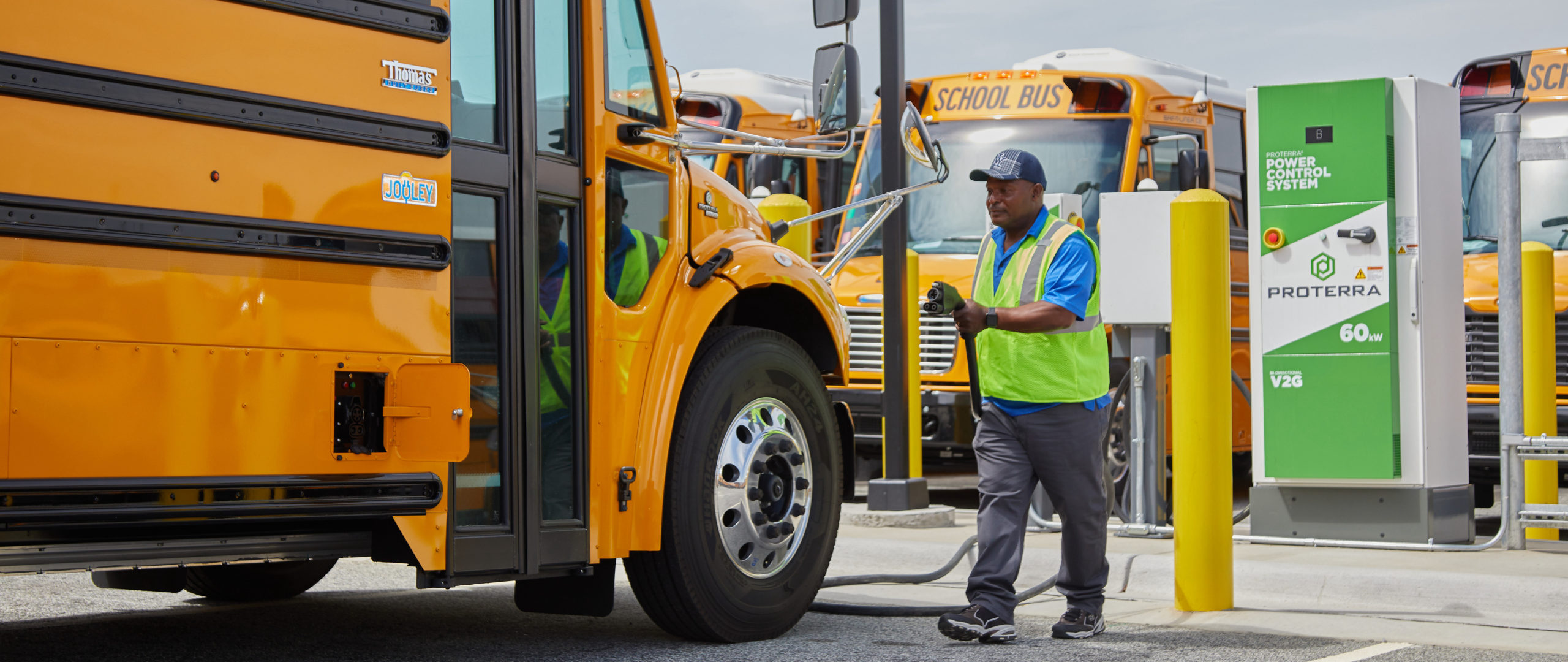If you’re considering electric buses for your public or private school, university, or your airport shuttle company, knowing where to look and the value of an electric bus is important. As electric vehicles (EV) advance, you want to be in the know and confident you have all the correct information. Because this technology is so new and quickly evolving, it can be hard to know where to go for answers.
At Carolina Thomas, we’re here to help you navigate the road to electric buses. We’ve already helped put North Carolina’s first electric school bus on the road. We know what you need to make the switch from a diesel bus to an electric bus. We’re investing in education, bringing key players together, and participating in EV pilot programs. As a trusted partner on your journey to electrification, we’re committed to helping you stay up-to-speed and map out scenarios for:
- Determining feasibility
- Identifying and applying for available funding
- Planning, building out, and managing necessary infrastructure requirements
- Optimizing fleet and routing management to maximize EV benefits
- Training for service technicians and drivers
- Understanding the value electric buses can offer for your long-term fleet management goals

Benefits of an Electric Bus
- A cleaner environment
By replacing fossil-fuel buses with electric buses, we could reduce 5.3 million tons of greenhouse gas emissions each year. EV buses produce zero emissions at the tailpipe, which can go a long way toward improving the air we breathe and the health of our planet. - Less maintenance
One of the greatest benefits is that electric buses have lower total cost of ownership. EV buses don’t have an engine, meaning there is far less routine maintenance — think oil, filters, etc. EVs have many plug-and-play components that are easy to replace. They can free up your team to focus on other projects. - Better performance
As battery technology continues to advance, buses are seeing an increase in range — up to 135 miles on a single charge. As EV innovation continues, they’ll likely improve greatly. Electric buses are more responsive and more efficient than traditional diesel or gasoline buses. - Less cost over time
Electricity has the lowest and most stable operating cost of any fuel. Operating an electric school bus can cost less than half of what it would take to run an older diesel school bus. And as demand increases for EVs, the infrastructure is improving and expanding to keep pace. These advances decrease consumer anxiety around route management between charges and required charge times.
Features of the Thomas Saf-T-Liner® C2 Jouley® Electric School Bus
- 135 mile operating range
- Charges in 2-3 hours at a DC fast charging station
- Seating up to 81 passengers
- Largest standard battery capacity of any electric bus: 226 kWh
- Drives up to 65 mph
- Accelerates from 0 to 60 mph in 49 seconds depending on final drive rear axle ratio
- State-of-the-art safety technology:
- Intellipark® braking (standard)
- SmartTrac™ electronic stability control (ESC) (standard)
- Auto-reversing doors
- Perimeter View™ 360 (PV360) camera package

The expertise you need to get you on your EV journey
We know what you need to get you where you need to be, which is why we only work with the right partners and products. The Thomas Saf-T-Liner® C2 Jouley® is the culmination of years of electric school bus research, development, and testing — making it the most well-thought-out electric school bus in the industry. Jouley® is powered by Proterra®, the leading manufacturer of battery and electric drivetrain solutions.
All our buses have undergone rigorous testing to ensure that they meet our commitment to quality. As a result, Thomas Built buses exceed industry standards for high voltage and functional safety, cold weather performance, reliability, and durability.
Your next step
The easiest thing about switching to EV is purchasing the bus itself, but we aren’t here to just sell you a bus. With careful planning and collaboration, Carolina Thomas can help you from start to finish as you research and integrate EV into your fleet. Fill out the form below to learn what your next step is in the transition to EV.
"*" indicates required fields
 Skip to main content
Skip to main content